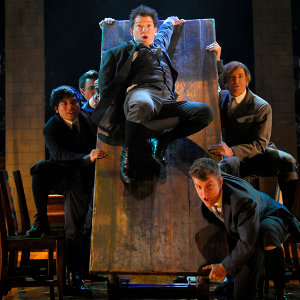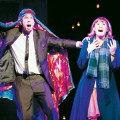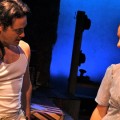Sex, eroticism, religion, atheism, Marxism, incest, rape, abortion, suicide, masturbation, homosexuality and sadomasochism. In 1892, Frank Wedekind left few taboos untouched in his first play, Spring Awakening: A Children’s Tragedy, which branded him an immoral enemy of bourgeois society. This and many of his later plays tackling similar themes were often censored or banned during and after his lifetime. A little more than a century later, writer/librettist Steven Sater and composer/orchestrator Duncan Sheik adapted Wedekind’s thorny play into a rock musical; it ran for 888 performances on Broadway and swept the 2007 Tony Awards. Ah, how the times have changed.
This month, San Jose Rep opens its 31st season with Spring Awakening, the musical, featuring new choreography by Sonya Tayeh of FOX’s So You Think You Can Dance. The story takes place in a German town around the late 1800s and follows a group of teenagers grappling with all of the dilemmas of adolescence: sexual frustration, academic performance anxiety, morality and self-discovery.
Though Spring Awakening has traveled on national tours, San Jose Rep’s production is one of the first original stagings by an American regional theatre and it finds its own voice under the artistic direction of Rick Lombardo. It’s a fresh and energetic version of the hit musical, synthesized by fearless choreography, inspired lighting and media design, a tight band and a talented cast—a blend of stage veterans and Broadway stars with local Bay Area up-and-comers and San Jose State University students.
With many of them making their San Jose Rep debuts, all of the lead actors deliver solid performances. Jason Hite plays a likable and rakish Melchior, who encourages his friends to rebel against societal norms. Eryn Murman, a member of the Broadway cast of Spring Awakening where she performed all of the female roles, plays a sweet and buoyant Wendla coming to terms with her budding sexuality. Zarah Mahler brings raw emotions to Ilse, an abused girl who turns to Bohemianism, and Miguel Cervantes fills out the comic but sad role of Moritz, an underachiever who struggles to meet his father’s expectations.
The supporting characters are equally strong. Joshua James as the sly homosexual and Lowell Abellon as the student infatuated with his piano teacher both exhibit natural comedic timing. Stage veterans Cindy Goldfield and Todd Alan Johnson play all of the adult roles with a confident ease. At times the cast produces caricatures instead of characters, understandable given the source material, but they ultimately strike a balance with the right amount of honest emotions to push the production beyond the realm of an after-school special and into riveting territory.
Through bold gestures and staccato movements, Sonya Tayeh’s choreography exposes the inner turmoil and angst of the teenagers as they fumble through adolescence under the heavy weight of Lutheran repression. “It was very important to me that the movement was emotionally driven and not technically driven, because it’s a very emotional and heavy-handed show,” said Tayeh. Her intimate rehearsals with the young cast sometimes turned into group therapy. “I demanded honesty from the beginning. That’s very difficult but it’s the only way to do it, to talk about our conflicts and our own personal demons… Sometimes we spent half the day talking and then the movements would just come out.”
Framing the stage, David Lee Cuthbert’s lighting and media design includes large digital video screens high above the backdrop that alternate between literal landscapes and abstract portrayals, just as the transitions between the spoken word and song move from the trappings of 19th-century Germany into the emotional world of contemporary rock and roll. Cuthbert’s smartest and most strikingly visceral display is during “The Dark I Know Well” when Martha (played by Kristen Majetich) sings of her frequent molestations by her father and her mother’s acquiescence; the outdoor landscape on the video screens fades to black, revealing a single, frail lightbulb swaying in the darkness.
Like all great musicals, Spring Awakening offers the standard fare of joy and sadness, but it’s also an experiment designed to test the comfort limits of the audience, providing moments of disturbing uneasiness and voyeuristic embarrassment, heightened by the silent and attentive cast members seated in the shadows around the edge of the stage for most of the salient action.
Although two of the lead characters meet unfortunate fates, Spring Awakening doesn’t pick sides in the Steppenwolf-esque battle between the ascetic life and the sensual life. If the story preaches anything, it’s that denying the existence of taboos and base desires doesn’t extinguish them but rather exacerbates their potential for unhealthy consequences. In this sense, Wedekind was an early champion of sex education and may have even influenced Sigmund Freud’s theories of conflicting life and death drives, repression and psychosexual development.
Steven Sater, the musical’s author, was in attendance at San Jose Rep’s opening night performance and said he felt like a grandparent. “I’ve seen it in so many countries around the world and now it’s in new creators’ hands,” said Sater. “The choreography was remarkable; Sonya did an amazing job. It was a real re-envisioning of what we had done on Broadway. I think Rick really honored the heart of the play while opening it up to his own fresh interpretation of the story. I’m glad it’s had such a warm reception in San Jose, and I hope that young people will find out about the show.”

 In-Depth with Sonya Tayeh
In-Depth with Sonya Tayeh 


